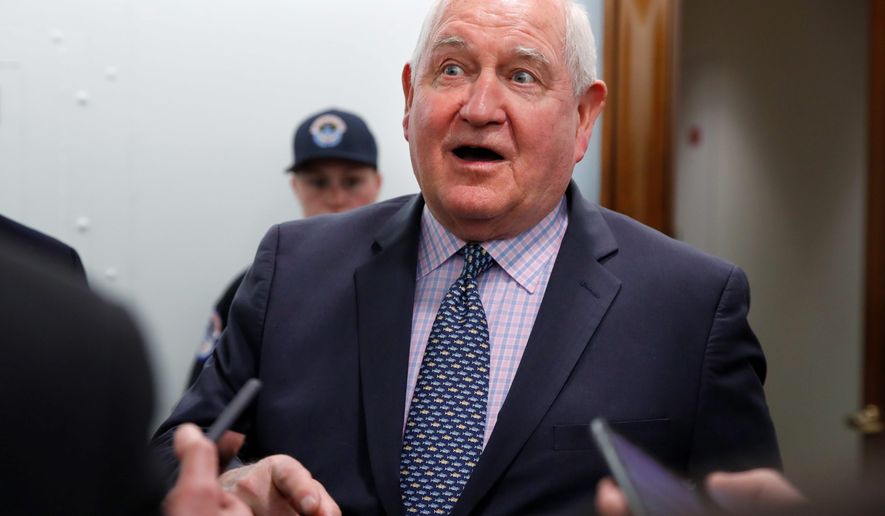The administration announced a $12 billion bailout plan Tuesday for farmers hurt by “unjustified retaliatory tariffs” in President Trump’s trade wars, while some GOP lawmakers and farmers recoiled at the government aid and urged the president to seek a negotiated peace with U.S. trading partners.
The plan will pay direct assistance to Midwest soybean producers and others targeted by retaliatory tariffs, including hog farmers and corn growers. The government’s purchases of excess crops would not require congressional approval and would come through the Commodity Credit Corporation, a wing of the Agriculture Department.
“This is a short-term solution that will give President Trump and his administration the time to work on long-term trade deals,” said Agriculture Secretary Sonny Perdue.
Speaking in Kansas City, Missouri, Mr. Trump urged farmers to be patient with his confrontational trade policies against China, the European Union and others.
“We have to stick it out,” Mr. Trump said. “We’re making tremendous progress. And the farmers will be the biggest beneficiary. Watch. Just be a little patient. These countries have been ripping us off for decades. It doesn’t take a week, it takes a little longer. Stick with us.”
The president is scheduled to host EU President Jean-Claude Juncker at the White House on Wednesday, with a discussion on trade high on the agenda. Mr. Trump has imposed tariffs on imported EU steel and aluminum, and has threatened new levies on cars.
Some key farm-state lawmakers, such as Sen. Ben Sasse, Nebraska Republican, criticized the proposed bailout plan.
“This trade war is cutting the legs out from under farmers, and White House’s ’plan’ is to spend $12 billion on gold crutches,” Mr. Sasse said. “America’s farmers don’t want to be paid to lose — they want to win by feeding the world. This administration’s tariffs and bailouts aren’t going to make America great again, they’re just going to make it 1929 again.”
The nonprofit group Farmers for Free Trade said farmers “need contracts, not compensation, so they can create stability and plan for the future.”
“This proposed action would only be a short-term attempt at masking the long-term damage caused by tariffs,” the group said.
Casey Guernsey, a former Missouri state legislator and a spokesman for Americans for Farmers and Families, urged Mr. Trump to “listen to America’s rural families and take immediate steps to resolve these trade disputes and find a middle ground that does not punish the agricultural sector.”
“Rather than accepting retaliatory tariffs and seeking to offset them with federal assistance, America’s producers believe the administration should look toward solutions that will enable them to export their homegrown goods to critical markets around the globe,” he said. “My family got into farming to sell beef, not to accept government assistance. While we need to hold our trading partners to account and ensure fair deals are reached, our government must also pursue long-term and sustainable solutions.”
A group representing soybean farmers also opposes the administration’s plan, and called instead for the elimination of tariffs.
“While soybean growers appreciate the Administration’s recognition that tariffs have caused reduced exports and lower prices, the announced plan provides only short-term assistance,” the American Soybean Association said in a statement. “ASA continues to call for a longer-term strategy to alleviate mounting soybean surpluses and continued low prices, including a plan to remove the harmful tariffs.”
And Americans for Prosperity, a conservative pro-growth group affiliated with the Koch network, said farmers want good trade policy, not a bailout.
AFP President Tim Phillips said, “$12 billion to aid farmers means the U.S. is essentially borrowing from China to offset the costs of tariffs imposed by China.” He then added, “It doesn’t get more Washington than that.”
Mr. Trump said he’s certain that he’s on the right path.
“Tariffs are the greatest!” he tweeted. “Either a country which has treated the United States unfairly on Trade negotiates a fair deal, or it gets hit with Tariffs. It’s as simple as that — and everybody’s talking!”
In his speech to the annual Veterans of Foreign Wars convention, Mr. Trump predicted, “we’re going to get it done.
“They’re all coming [to negotiate],” he said of U.S. trading partners. “They don’t want to have those tariffs put on them. They’re all coming to see us.”
But the president acknowledged that China, the EU and others are trying to pressure the U.S. to rescind its tariffs by imposing their own levies on U.S. agricultural products from regions that are part of Mr. Trump’s political base.
“They’re all aiming at anybody that likes me,” Mr. Trump said.
• Dave Boyer can be reached at dboyer@washingtontimes.com.




Please read our comment policy before commenting.